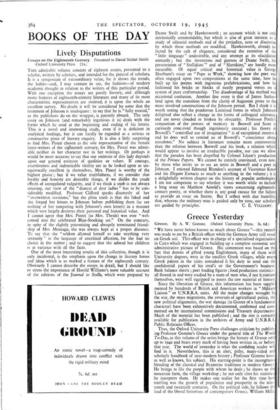BOOKS OF THE DAY
Lively Disputations
Essays on the Eighteenth Century. Presented to David Nichol Smith (Oxford University Press 21s.)
THIS admirable volume consists of eighteen essays, presented to a scholar, written by scholars, and intended for the perusal of scholars. It is a symposium of extraordinary value, for it shows the trends, the habits—and, I may venture to say, the fashions—of modern academic thought in relation to the writers of this particular period. With one exception the essays are purely literary, and although many features of eighteenth-century literature and many of its most characteristic representatives are omitted, it is upon the whole an excellent survey. No doubt it will be considered by some that the treatment of Johnson is inadequate : to say that he is "fully treated," as the publishers do on the wrapper, is patently absurd. The only essay on Johnson (and remarkably ingenious it is) deals with the forms which he used at the beginning and ending of his letters. This is a novel and interesting study, even if it is deficient in analytical findings, but it can hardly be regarded as a serious or constructive piece of literary enquiry. It is also a little surprising to find Mrs. Piozzi chosen as the sole representative of the female letter-writers of the eighteenth century, for Mrs. Piozzi was admir- able neither in her character nor in her writings. Or perhaps it would be more accurate to say that our estimate of this lady depends upon our general estimate of qualities or values. If courage, assertiveness and indomitable vitality are. to be looked upon as un- equivocally excellent in themselves, Mrs. Piozzi is worthy of the highest praise ; but if we value truthfulness, if we consider that loyalty and honesty are desirable things' if we dislike the crude effects of unregulated vulgarity, and if we think a snob is not always amusing, our view of the "dearest of dear ladies" has to be con- siderably modified. Professor Clifford speaks discreetly of her "overwritten revisions," but the plain truth is that she faked and she forged her letters to Johnson before publishing them (to say nothing of her tampering with Johnson's own letters) in a manner which very largely destroys their personal and historical value. And I cannot agree that Mrs. Piozzi (as Mrs. Thrale) was ever "wel- comed into the celebrated Blue-Stocking set." On the contrary, in spite of the slightly patronising and abruptly terminated friend- ship of Mrs. Montagu, she was always kept at a proper distance. To say that she "seldom allowed herself to take anything very seriously" is the language of uncritical affection, for she had no choice in the matter ; and to suggest that she adored her children is at variance with all the facts.
One of the most interesting results of this collection, though it is only incidental, is the emphasis upon the change in literary forms and ideas which is so marked a feature of the eighteenth century. Obviously I cannot describe the essays in detail, but I should like to stress the importance of Harold Williams's most valuable account of the editions of the Journal to Stella, which were prepared by Deane Swift and by Hawkesworth ; an account which is not only intrinsically commendable, but which is also of great interest as a study of editorial methods and of the prejudice, taste or discretion by which these methods are modified. Hawkesworth, already in- fected by the cult of elegance, considered the retention of the "little language" undesirable, and any attempt at its elucidation unmanly ; but the inventions and guesses of Deane Swift, his presentation of " Stellakins " and of " Sluttikins," are hardly more excusable. Of equal critical and historical value is George Sherburn's essay on "Pope at Work," showing how the poet was often engaged upon two compositions at the same time, how he built up his poems with ingenious prefabrications, and how he fashioned his bricks or blocks of neatly prepared verses on a system of pure craftsmanship. The disadvantage of his method was occasional confusion. Another fine essay is that of James Suther- land upon the transition from the clarity of Augustan prose to the more involved constructions of the Johnson period. But I think it is worth noting that the ponderous Latinised forms in which Johnson delighted also reflect a change in the forms of colloquial utterance, and are never clouded or broken by obscurity. Professor Pottle's comparison of the powers of memory in Boswell and Scott is curiously conceived though ingeniously executed ; his theory of Boswell's "controlled use of imagination" is of exceptional interest ; and he does well to remind us of Boswell's "conscience about anecdotes." No subject in literature remains more controversial than the relation between Boswell and his book, a relation which would appear to involve an irreducible paradox, nor can we allow that the paradox has been dispelled by Colonel Isham's production of the Private Papers. We cannot be entirely convinced, even now, by those who invite us to see an artist in Boswell and a poet Johnson. I enjoyed Edmund Blunden's account of Vicesimus Kno and his Elegant Extracts as much as anything in the volume ; it is a delightfully written chapter on the history of popular anthologies. I am not competent to say whether it was worth while to incl
a long essay on Matthew Arnold's views concerning eighteenth century poetry, or whether there is any" good excuse for the failur to provide an essay on Sterne. But I reflect with due humility, that, whereas the ordinary man is guided only by taste, our schola


























 Previous page
Previous page